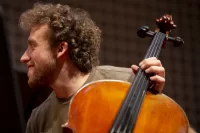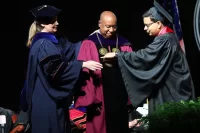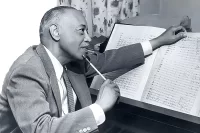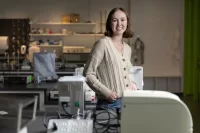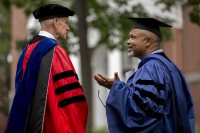
As Bates professors lined up for Convocation last week, we asked a few what they’re excited to teach this fall.
In sum, they told us about some things old, some things new, and some things renewed.
In his second year at Bates, Assistant Professor of English José Villagrana is teaching a new course, “Milton and the English Civil War.”
John Milton, of course, is a canonical figure in literature. By looking at Milton’s writings through the lens of the English Civil War (1642–51), Villagrana’s students can make fresh connections to “timely discourses on revolution, armed conflict, and the role of free speech and censorship.”
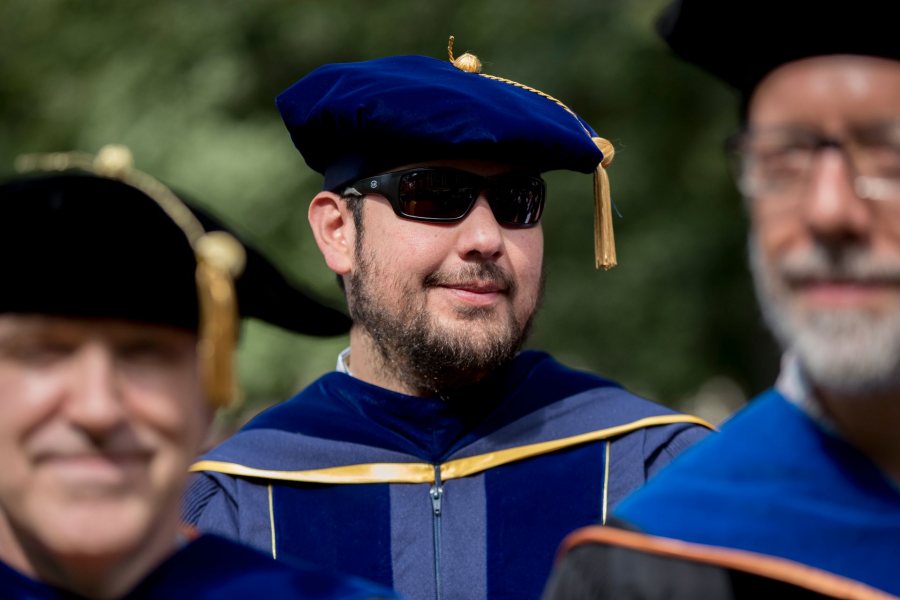
In his second year at Bates, Assistant Professor of English José Villagrana is teaching a new course, “Milton and the English Civil War.” (Phyllis Graber Jensen/Bates College)
Lecturer in Anthropology Kristen Barnett looks forward to teaching her two sections of “Introduction to Archaeology.” She began teaching the course three years ago and has completely overhauled it.
Now the course focuses more attention on concepts of social justice, ethics, and “tensions between Indigenous communities and the archaeological community,” she explains. The course will also delve into questions of how certain colonizing practices are “established and perpetuated through archaeology.”
A Bates faculty member since 1991, Professor of Physics Hong Lin is trying something new this year: teaching one of the department’s upper-level courses, “Electrodynamics.”
“It will be my first time teaching this course, but I love the topic,” she says. Lin has taught a similar course, “Electricity and Magnetism,” which covers the material at a lower level. “It will be good to help students see the topic in more depth,” she says.
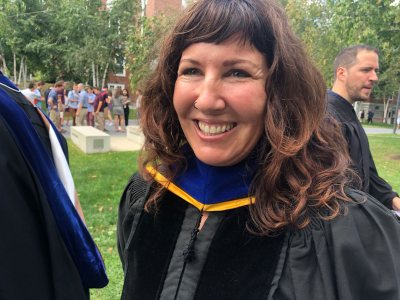
Lecturer in Anthropology Kristen Barnett has revamped the introductory archaeology course. (Jay Burns/Bates College)
In one of 39 First Year Seminars, which are geared toward the college’s newest students, Professor of Anthropology Elizabeth Eames will teach “Disney Demystified: Race, Gender, and Sexuality in the Magic Kingdom.”
Popular culture being what it is, “we all have a bit of Disney in us,” Eames says. In other words, “Disney is a cultural text. And from that text, we can discern America’s beliefs and values. And we can unearth the cultural politics embedded in Disney productions.”
Professor of Psychology Georgia Nigro is teaching “Community-Based Research Methods.” Offered in a variety of disciplines, methods courses give students a chance to exercise their emerging research skills.
This fall, Nigro says, her 18 students “are going to learn with a community partner, the Restorative Justice Institute of Maine.” The institute is working closely with the Lewiston School Department, which is seeking to infuse restorative practices into the local schools.
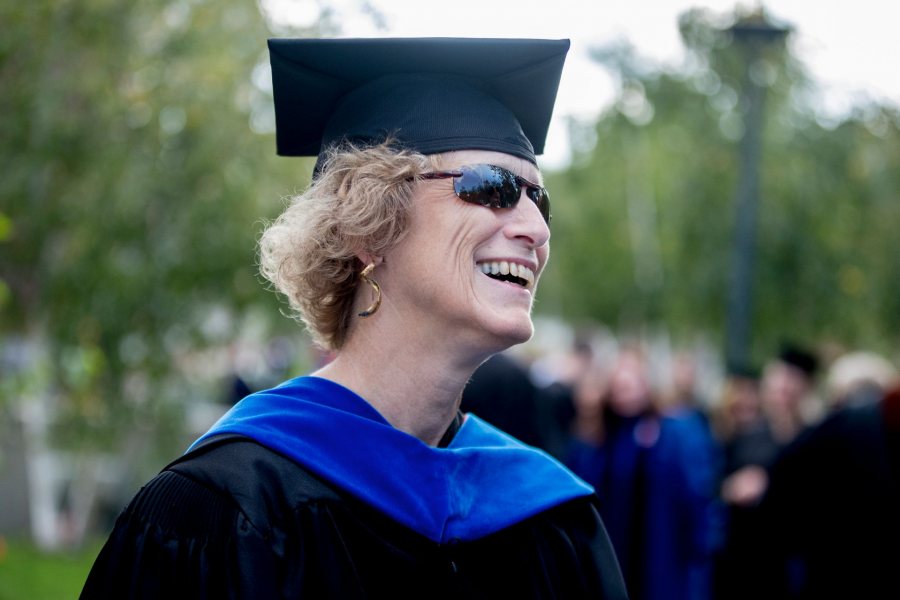
Professor of Psychology Georgia Nigro is teaching a course that will support efforts to introduce restorative justice practices in Lewiston public schools. (Phyllis Graber Jensen/Bates College)
“My students will look at data already collected from teachers, who are working to be more restorative in their practices,” Nigro says. Restorative justice tries to “replace the old-fashioned punitive disciplinary practices with practices that repair the harm.”
Raj Saha ’03, a lecturer in geology and physics, is eager to teach his First Year Seminar, “The Living Planet,” and hopes his students are ready for a surprise.
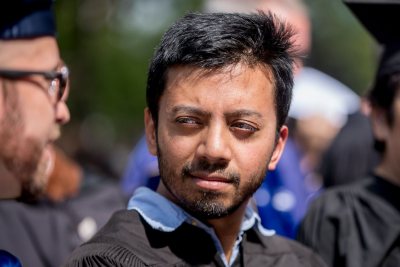
Raj Saha ’03, a lecturer in geology and physics, is teaching a First Year Seminar, “The Living Planet.” (Phyllis Graber Jensen/Bates College)
In its examination of intricate connections among the Earth’s living systems, the course sits “at the intersection of math, science, environmental studies, and social justice,” he says.
It might surprise these new Bates students, he says, “that there is scientific basis for concepts that we often label as moral or ethical, such as the need for diversity, what diversity does in an ecosystem, and how you can translate these qualities to society in general — what makes us more resilient.”
Su Langdon, a lecturer in psychology, is excited to have more time to teach “Principles of Psychology.”
Drawing from the tenets of problem-based learning, the course uses “consider scenarios,” in which students look at real-life situations from psychological perspectives. For example, how do gymnasts and other athletes accomplish complex motoric tasks? Why do we feel “all gooey inside” when we think about someone we’re attracted to?
Having taught the course a “gazillion times,” Langdon wanted the flexibility to add a few more scenarios, including ones her students suggested. To do so, “I needed to reclaim some time,” she said. “To be more creative, I needed about a week.”
Working with the Accessible Education and Student Support office — to ensure that the changes met the needs of all her students — Langdon moved the course’s traditional in-class exams to online exams, outside of class.
And presto: A whole week of new time!
